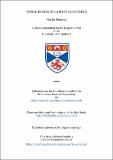Files in this item
Three essays in labour economics
Item metadata
| dc.contributor.advisor | Merkurieva, Irina | |
| dc.contributor.advisor | Braun, Sebastian | |
| dc.contributor.advisor | Barsbai, Toman | |
| dc.contributor.author | Mansoor, Nayha | |
| dc.coverage.spatial | 182 p. | en_US |
| dc.date.accessioned | 2020-02-20T13:00:44Z | |
| dc.date.available | 2020-02-20T13:00:44Z | |
| dc.date.issued | 2020-06-26 | |
| dc.identifier.uri | https://hdl.handle.net/10023/19506 | |
| dc.description.abstract | This thesis extends the existing literature on the response of labour markets to different types of economic shocks. First, we examine the effects of sector-specific fluctuations in job separation and job finding rates on the overall unemployment, sectoral allocation of labour and wages by solving a two-sector search and matching model with heterogeneous workers. The simulated results show how sector-specific shocks spill over the rest of the economy, causing workers to relocate between sectors in search of jobs. Inter-sectoral reallocation depends on the distribution of worker productivity in the affected sector. When an adverse shock hits a sector that attracts workers with relatively low productivity, the most productive among displaced workers move to compete for jobs in the sector with higher productivity. This offsets some of the increase in unemployment, subject to the ability of unaffected sector to employ additional workers. Next, we conduct meta-analysis to explain discrepancies between estimated effects of immigration shocks on wages in the literature. The results show that wage impact of immigration tends to be small in magnitude and negative significant. Labour market conditions at the period of study play a significant role in explaining the differences in measured impact. The estimates vary across countries and are related to the choice of modelling approach and estimators. Finally, we use EU-LFS dataset to analyse unemployment and labour market flows in Europe between 2006 and 2016. We identify the relative impact of shocks to job finding and separation rates on unemployment and investigate the role of socio-demographics, urbanisation and immigration status in shaping worker flow patterns in Europe. We find that over the studied period job losses accounted for three quarters of the rise in unemployment. The analysis of socio-demographic characteristics of the unemployed shows that young and less educated workers contributed the most to employment losses. Recent and intermediate immigrants in cities contributed to employment losses. | en_US |
| dc.language.iso | en | en_US |
| dc.publisher | University of St Andrews | |
| dc.rights | Creative Commons Attribution-NonCommercial-NoDerivatives 4.0 International | * |
| dc.rights.uri | http://creativecommons.org/licenses/by-nc-nd/4.0/ | * |
| dc.subject | Unemployment | en_US |
| dc.subject | Wages | en_US |
| dc.subject | Sectoral shock | en_US |
| dc.subject | Meta-analysis | en_US |
| dc.subject | Worker flows | en_US |
| dc.subject | Socio-demographics | en_US |
| dc.subject | Degree of urbanisation | en_US |
| dc.subject | Immigration | en_US |
| dc.subject.lcc | HD4901.M2 | |
| dc.subject.lcsh | Labor economics | en |
| dc.subject.lcsh | Labor market | en |
| dc.subject.lcsh | Unemployment | en |
| dc.subject.lcsh | Wages | en |
| dc.title | Three essays in labour economics | en_US |
| dc.type | Thesis | en_US |
| dc.contributor.sponsor | University of St Andrews. School of Economics & Finance | en_US |
| dc.type.qualificationlevel | Doctoral | en_US |
| dc.type.qualificationname | PhD Doctor of Philosophy | en_US |
| dc.publisher.institution | The University of St Andrews | en_US |
| dc.identifier.doi | https://doi.org/10.17630/10023-19506 |
The following licence files are associated with this item:
This item appears in the following Collection(s)
Except where otherwise noted within the work, this item's licence for re-use is described as Creative Commons Attribution-NonCommercial-NoDerivatives 4.0 International
Items in the St Andrews Research Repository are protected by copyright, with all rights reserved, unless otherwise indicated.


